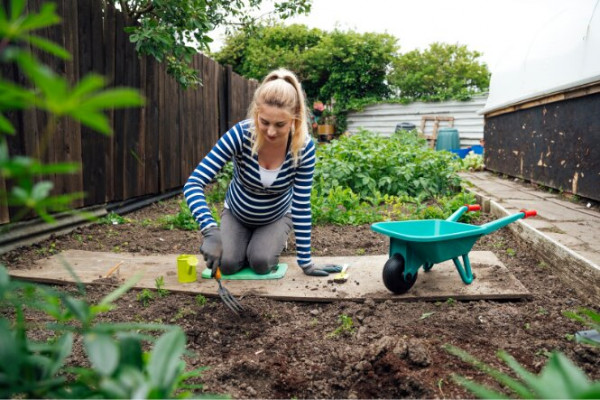If you're a frequent visitor to Healthify, why not share our site with a friend? Don't forget you can also browse Healthify without using your phone data.
Toxoplasmosis infection in pregnancy
Key points about toxoplasmosis infection in pregnancy
- Toxoplasmosis infection during pregnancy can be very serious. Care must be taken to avoid exposure to the parasite that causes it.
- You can get toxoplasmosis by eating raw or undercooked meat or by contact with infected cat faeces (poo/tūtae).
- There are some simple precautions you can follow to reduce your chances of becoming infected.
- If you are pregnant and get toxoplasmosis, you can pass the infection on to your developing baby. This is called congenital toxoplasmosis.
- A baby with toxoplasmosis may develop eye or brain problems.
- You can't catch toxoplasmosis from stroking a cat or from coming into contact with someone who has a toxoplasmosis infection.

Toxoplasmosis is not routinely tested for during pregnancy in Aotearoa New Zealand. You may request a blood test from your healthcare provider if you feel you may have put yourself at risk or you're concerned about symptoms.
Blood tests for toxoplasmosis can be done at any stage before or during pregnancy.
Some symptoms of toxoplasmosis are fever, swollen lymph nodes, headache, muscle aches and skin rash. However, most people won’t get any symptoms at all.
If your blood test results come back positive for toxoplasmosis, further tests can be carried out to find out if your baby has been infected. Your healthcare provider will discuss the risks and benefits of conducting these tests. The most common test is amniocentesis. This is a technique where amniotic fluid is removed by a fine needle from the amniotic sac – the fluid-filled sac around the baby. This procedure carries a 0.5–1% chance of causing miscarriage.
The risk and severity of the baby’s infection depend upon when in pregnancy the infection occurs.
- You're more likely to pass the infection on to your baby if you become infected later in your pregnancy. Studies suggest that when mothers are infected in the first trimester, about 15–20% of fetuses become infected, compared to about 30% in the second trimester and about 60% in the third.
- However, the earlier in pregnancy the infection occurs, the more serious the baby’s symptoms tend to be.
Once you have had toxoplasmosis you are normally immune for the rest of your life, unless you have a weakened immune system (eg, caused by HIV/AIDS, chemotherapy or immunosuppressant medicines). If you have been infected with Toxoplasma before becoming pregnant your unborn child will most likely be protected by your immunity.
Toxoplasmosis can cause premature birth or the birth of a very small (low birthweight) baby. About 90% of newborns infected with toxoplasmosis during pregnancy don't show any immediate symptoms, but more signs and symptoms may develop over time.
These may include:
- swollen lymph nodes
- bruising
- jaundice
- anaemia and/or enlarged liver or spleen.
Sometimes serious problems like impaired eyesight, intellectual disability, seizures, hearing loss and developmental delays can occur. Early diagnosis and treatment will give your pēpi the best chance to grow and develop normally.
If you think you may have been exposed to toxoplasmosis infection and you are pregnant see your healthcare provider. They will take a blood test to check for infection.
If the laboratory results confirm infection, your healthcare provider will usually recommend treatment with 1 or more medicines. These appear to reduce the number and severity of the baby’s symptoms.
If you're 18 weeks or more pregnant, your healthcare provider may recommend an amniocentesis to see if the fetus is infected.
Apps reviewed by Healthify
You may find it useful to look at some Pregnancy apps.
Follow these helpful tips to reduce your risk of exposure to Toxoplasma.
When eating or preparing food:
- only eat meat that has been thoroughly cooked (eg, with no trace of blood or pinkness)
- avoid raw meat and cured meat, eg, salami or ham
- wash your hands, kitchen utensils and chopping board thoroughly after preparing raw meat
- wash all fruit and vegetables thoroughly before cooking/eating to remove all traces of soil
- avoid unpasteurised milk and dairy products made from it.
If you have a cat:
- avoid changing cat litter if possible – if no one else can perform the task, wear disposable gloves and wash your hands with soap and water afterwards
- ensure that the cat litter box is changed daily – the Toxoplasma parasite doesn't become infectious until the poo has been there for 1 to 5 days
- feed your cat commercial dry or canned food, not raw or undercooked meats
- keep cats indoors, so they cannot eat infected rodent, birds or other small animals
- avoid stray cats, especially kittens and do not get a new cat while you are pregnant
- keep children's outdoor sandboxes/sandpits covered.
Image credit: Canva
When gardening:
- wear gloves during contact with soil or sand because it might be contaminated with cat poo that contains Toxoplasma
- wash your hands with soap and water after gardening or contact with soil or sand.
Toxoplasmosis(external link) NHS Choices, UK
Food and pregnancy(external link) Ministry for Primary Industries, NZ
Healthy food and drinks during pregnancy(external link) Health New Zealand | Te Whatu Ora
Apps
References
- Toxoplasmosis(external link) Mayo Clinic, US, 2022
- Toxoplasmosis(external link) Centers for Disease Control and Prevention, US, 2024
- Toxoplasmosis – general FAQs(external link) Centers for Disease Control and Prevention, US, 2024
- Congenital toxoplasmosis(external link) Boston Children's Hospital, US
Credits: Healthify editorial team. Healthify is brought to you by Health Navigator Charitable Trust.
Reviewed by: Claire Salter, Pharmacist Tauranga
Last reviewed:






